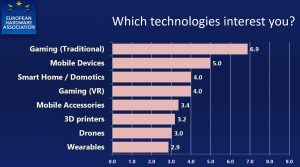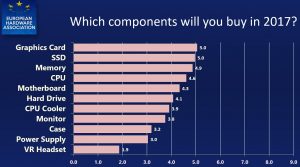This week, the European Hardware Association presented its 2017 buying trends research report, giving us a hint at what Europeans are most interested in tech-wise in 2017. While there has been growth and plenty of buyer intent as far as CPUs and GPUs go, it looks like interest in virtual reality has dipped a little bit since Q1 2016.
The EHA is a partnership spanning across multiple European tech sites including KitGuru. In total across all nine member sites the EHA has the ability to reach more than 20 million readers, which has helped in this market research. Over the last few months, the EHA has been surveying what technology readers are most interested in going into 2017 and what they plan on buying.
While back in Q1 2016 there was high interest in virtual reality across the board, in 2017 there is a slight decline and even lower buyer intent. As you can see in the graph above, there is still plenty of interest in traditional gaming and mobile devices but VR has dropped below Smart Home in terms of interest.
The second graph shows buyer intent across the 10,000 responses that the EHA received. While many are still planning on buying traditional gaming hardware or a mobile device, there appears to be little intent across those surveyed to actually adopt VR. Of those who responded, 40 percent had actually tried VR previously, so adoption could still happen but it seems not everyone is won over just yet.
One factor that is holding many readers back from adopting VR any time soon is the lack of ‘killer app'. There are some good games available on the Oculus Rift and HTC Vive but nothing truly Triple A like we see on traditional gaming platforms. Unfortunately, these huge games take years to produce and cost an awful lot of money to make and no one studio or brand has really stepped up just yet to bring that to market.
The second problem here is that killer apps don't tend to get made until hardware starts selling. If nobody is buying the hardware, developers have less incentive to truly invest on developing true, big budget games for VR headsets.
The full presentation will be made available for public viewing later this week for those interested but for now, this is a quick look at the EHA's findings as far as virtual reality is concerned.
KitGuru Says: I'm not too surprised that few people are planning on buying a VR headset this year. The technology still needs to mature a bit and many are waiting on second generation headsets before making the jump. Still, perhaps over time companies like Oculus and HTC will be able to win more people over, after all the VR market is still in its very early days.
 KitGuru KitGuru.net – Tech News | Hardware News | Hardware Reviews | IOS | Mobile | Gaming | Graphics Cards
KitGuru KitGuru.net – Tech News | Hardware News | Hardware Reviews | IOS | Mobile | Gaming | Graphics Cards




